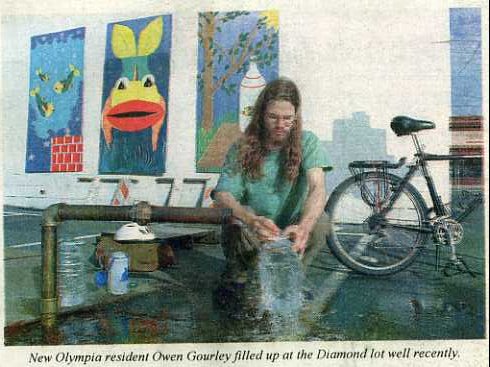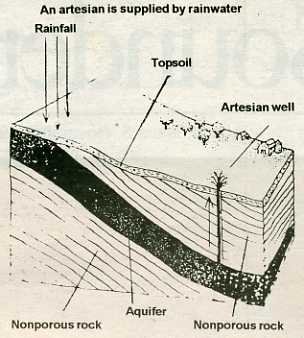|
  The South Sounder, November 1997
Artesian well preservationists spring into actionby Betsy Model For many Thurston County residents, the term made famous by the Olympia Brewing Company, "it's the water" has become more than a saying, it's become a life philosophy. "Water," community water like Olympia's," said one longtime resident "isn't simple water at all. It's the spirit of the community. Our water is our soul." The waters in question are the artesian springs that are flowing today even as they did over one hundred years ago, continually replenishing downtown Olympia wells, flowing into drain runoff systems and creating a public well and gathering right in the middle of a downtown parking lot. Those same waters have also created a host of questions concerning water access, drinking water safety and property liability. Within the last two years, three of the more than ninety known wells in the Olympia area have been the target of questions concerning water purity and access liability. The artesian wells located at two downtown restaurants, the Spar Cafe and King Solomon's Reef, came under state and county scrutiny in 1995 when concerns over water test results prompted government officials to force The Spar Cafe to stop using the artesian waters flowing into the restaurant's basement and to switch to city water. According to Spar owner Alan McWain, the resulting switch to chlorinated city water left a bad taste in his customer's mouths. "For over fifty years, The Spar Cafe has been serving customer great food and drink made with our own artesian well water." said McWain. "We tested our water regularly and never had a problem; for the first time, in l995, we had one test sample out of numerous samples taken the same day test positive for coliform. We were never able to duplicate the positive test and neither were the inspectors, but they essentially closed down our well anyway." Although he wasn't told to stop using his restaurant site's well water King Solomon's Reef owner Mike Solomon faced the same regulatory demands to bring his well and well housings up to new standards as The Spar. In the last two years, McWain and Solomon estimate that they've each invested $25,000 in researching their water sources, rights, and regulatory requirements. McWain feels that had the two restaurants not cooperated and supported each other with shared information and resources, the fees would have totaled far more than their combined $50,000. But it's cooperation of a different sort that may save the third major artesian well source for the community at large. According to Jim Ingersoll committee coordinator for Friends of Artesians, an Olympia-based community action group, collaboration between the private and public sector may save and even enhance the major spring located at the Diamond parking lot on 4th Avenue. Since the first public meeting held in 1996, the Friends of Artesians have collected nearly $4,500 in donations and a sizable commitment in professional services towards a proposed "pocket park" surrounding the 4th Avenue well site. With a proposed budget of $25,000, the group hopes to rebuild the well to regulatory standards and surround the site with water-inspired murals, art and park structures. With a second phase of fund-raising, the group hopes to form a foundation whose trust funds will pay for the perpetual testing and maintenance of the well as well as removing the burden of liability from Diamond Parking, who owns the land the well is located on. According to Ingersoll, labor donations from hydro-geologists and engineers have made collaborative efforts with city, county and state officials possible while local Olympia retailers Rich's Tires and Olympic Outfitters have dedicated nearby building walls for murals and contributions by local artists. Research on water rights and questions of ownership, artist's drawings, engineering survey reports and committee member Nadine Romero's hydro-geological findings are part of a comprehensive report and plan to be submitted to Washington Department of Health. Funded by donations from Diamond Parking and Puget Sound Systems Group, the 91-foot 4th Avenue well underwent a full spectrum chemical testing earlier this spring and passed all safety requirements. According to Carl Johnson, regional engineer with the Washington State Department of Health's Southwest Drinking Water Operation, the water tested unusually high in iron and manganese, but in amount acceptable for consumption. That the water tested well doesn' t come as a surprise to any of the people who regularly drink or make bottling pilgrimages to Olympia' s many artesian wells. McWain, who hoped to have The Spar Cafe back on artesian water by the second weekend in November, claimed that customers notice major differences in the taste of their coffee and mixed drinks. There is, he says, a "clear sweetness to the water. The water simply tastes good." Karen Lohman, an Olympia resident for 22 years, said that the taste of the water has always been a major reason for her treks to the 4th Avenue well. The taste, she said, and a bit of spirituality. "I see access to the artesians as a symbolic right of the residents of this area. The water and the wells here are pure and ancient. It's kind of a spiritual water right. And face it." Lohman said: "City water just doesn't taste very good." The word "artesian" comes from the French province of Artois, where artesian wells were first drilled in the 15th century. Artesian wells have their own natural pressures caused by ground water being trapped beneath a confining layer of soil. Rain water saturates the ground at higher levels and travels downhill by force of gravity where it is trapped by the impermeable layer of rock or clay. The water builds up pressure as gravity feeds more and more water into the aquifer. Artesian springs occur where that same water, under pressure, finds its way to the surface through cracks or holes in the ground. In the mid-1800s, an artesian well on what is now 4th Avenue and Capitol Way supplied most of the community with water. Artesian wells were the primary source of drinking water for Olympia then. For many current-day residents, that hasn't changed one bit. "People make weekly, and sometimes even daily pilgrimages to our wells," said Karen Lohman. "Oh any given day you can visit the (4th Avenue) well location and meet people who will tell you that it's changed their lives health-wise or emotionally. I know that there's something very special about that water... .it's a constant gift, this water that flows up and out of the earth at our feet."
|


